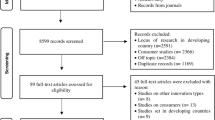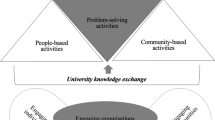Abstract
Communities of Practice (CoPs) are a promising concept for transdisciplinary knowledge co-creation in sustainable agricultural development, but empirical evidence from the farmers’ viewpoint is scarce. This paper contributes to empirical insights on the knowledge creation in CoPs as valued by farmers. Using concepts from CoP theory (domain, community, and practice) and the value creation framework (VCF) developed by Wenger et al. (Promoting and assessing value creation in communities and networks: a conceptual framework. Netherlands Ruud de Moor Center Rapport 18:60, 2011), we examined two cases issuing from a European project on sustainable dairy farming. Results indicate regional differences between the two cases and relate CoP features to value creation cycles (immediate, potential, applied, realized and reframing value). They show how specific features regarding domain, community, and practice development can enhance knowledge creation on sustainable agricultural development. Domain development should be considered consciously taking into account the project duration. The community should include actors with specific competencies, such as farmers with an open attitude, researchers with (practical) domain expertise, and advisors with skills as translators between researchers and farmers. The practice development, or the actual knowledge creation, should unify two equally important types of interaction that contribute differently to value creation in CoPs: individual farmer–researcher–advisor interactions and farmer group–advisor interactions. Our research provides both valuable information for designing and managing knowledge co-creation initiatives and anchors further research on competencies and activities required to foster the two types of interactions for knowledge creation.


Similar content being viewed by others
Notes
Both regions are involved in the EU Horizon2020 project EuroDairy, albeit with other project partners and farmers.
References
Bailey AP, Garforth CJ, Angell B, Scott T, Beedell JDC, Beechener S, Rana RB (2006) Helping farmers adjust to policy reforms through demonstration farms: lessons from a project in England. J Farm Manag 12:613–625
Belcher BM, Rasmussen KE, Kemshaw MR, Zornes DA (2016) Defining and assessing research quality in a transdisciplinary context. Res Eval 25:1–17. https://doi.org/10.1093/reseval/rvv025
Bergevoet RHM, Ondersteijn CJM, Saatkamp HW, Van Woerkum CMJ, Huirne RBM (2004) Entrepreneurial behaviour of dutch dairy farmers under a milk quota system: goals, objectives and attitudes. Agric Syst 80:1–21. https://doi.org/10.1016/j.agsy.2003.05.001
Bertram R, Culver DM, Gilbert W (2016) Creating value in a sport coach community of practice: a collaborative inquiry. Int Sport Coach J 3:2–16
Curry N, Kirwan J (2014) The role of tacit knowledge in developing networks for sustainable agriculture. Sociol Rural 54:341–361. https://doi.org/10.1111/soru.12048
Darnhofer I, Bellon S, Dedieu B, Milestad R (2010) Adaptiveness to enhance the sustainability of farming systems. A review. Agron Sustain Dev 30:545–555. https://doi.org/10.1051/agro/2009053
Eshuis J, Stuiver M (2005) Learning in context through conflict and alignment: farmers and scientists in search of sustainable agriculture. Agric Hum Values 22:137–148
Esparcia J (2014) Innovation and networks in rural areas. An analysis from European innovative projects. J Rural Stud 34:1–14. https://doi.org/10.1016/j.jrurstud.2013.12.004
Franz N, Piercy F, Joseph D, Richard R, Westbrook J (2010) How farmers learn: implications for agricultural educators. J Rural Soc Sci 25:37–59
Hall J, Pretty J (2008) Then and now: Norfolk farmers’ changing relationships and linkages with government agencies during transformations in land management. J Farm Manag 13:393–418
Hazard L, Steyaert P, Martin G, Couix N, Navas ML, Duru M, Lauvie A, Labatut J (2017) Mutual learning between researchers and farmers during implementation of scientific principles for sustainable development: the case of biodiversity-based agriculture. Sustain Sci. https://doi.org/10.1007/s11625-017-0440-6
Hoffman M, Lubell M, Hillis V (2014) Linking knowledge and action through mental models of sustainable agriculture. Proc Natl Acad Sci. https://doi.org/10.1073/pnas.1400435111
Hoffmann V, Probst K, Christinck A (2007) Farmers and researchers: How can collaborative advantages be created in participatory research and technology development? Agric Hum Values 24:355–368. https://doi.org/10.1007/s10460-007-9072-2
Ingram J (2008) Agronomist–farmer knowledge encounters: an analysis of knowledge exchange in the context of best management practices in England. Agric Hum Values 25:405–418. https://doi.org/10.1007/s10460-008-9134-0
Klerkx L, Proctor A (2013) Beyond fragmentation and disconnect: networks for knowledge exchange in the English land management advisory system. Land Use Policy 30:13–24. https://doi.org/10.1016/j.landusepol.2012.02.003
Klerkx L, Van Mierlo B, Leeuwis C (2012) Evolution of systems approaches to agricultural innovation: concepts, analysis and interventions. In: Farming systems research into the 21st century: the new dynamic. Springer, Dordrecht, pp 457–483
Koutsouris A, Papa E, Chiswell H, Debruyne L, Ingram J, Marchand F (2017) The analytical framework. Demonstration farms as multi-purpose structures, providing multi-functional processes to enhance peer-to-peer learning in the context of innovation for sustainable agriculture, AgriDemo F2F
Lankester AJ (2013) Conceptual and operational understanding of learning for sustainability: a case study of the beef industry in north-eastern Australia. J Environ Manag 119:182–193. https://doi.org/10.1016/j.jenvman.2013.02.002
Mann C, Schäfer M (2017) Developing sustainable water and land management options: reflections on a transdisciplinary research process. Sustain Sci. https://doi.org/10.1007/s11625-017-0451-3
McKellar K, Pitzul KB, Yi JY, Cole DC (2014) Evaluating communities of practice and knowledge networks: a systematic scoping review of evaluation frameworks. EcoHealth 11:383–399. https://doi.org/10.1007/s10393-014-0958-3
Morgan K, Murdoch J (2000) Organic vs. conventional agriculture: knowledge, power and innovation in the food chain. Geoforum 31:159–173. https://doi.org/10.1016/S0016-7185(99)00029-9
Moschitz H, Home R (2014) The challenges of innovation for sustainable agriculture and rural development: integrating local actions into European policies with the reflective learning methodology. Action Res 12:392–409. https://doi.org/10.1177/1476750314539356
Moschitz H, Roep D, Brunori G, Tisenkopfs T (2015) Learning and innovation networks for sustainable agriculture: processes of co-evolution, joint reflection and facilitation. J Agric Educ Ext 21(1):1–11
Nonaka I, Takeuchi H (1995) Introduction to knowledge in organizations. Knowledge-Creating Company, Oxford University Press, New York, pp 3–19
Novo A, Jansen K, Slingerland M (2015) The novelty of simple and known technologies and the rhythm of farmer-centred innovation in family dairy farming in Brazil. Int J Agric Sustain 13:135–149. https://doi.org/10.1080/14735903.2014.945320
Oreszczyn S, Lane A, Carr S (2010) The role of networks of practice and webs of influencers on farmers’ engagement with and learning about agricultural innovations. J Rural Stud 26:404–417. https://doi.org/10.1016/j.jrurstud.2010.03.003
Reed M, Stringer LC, Fazey I, Evely A, Kruijsen JHJ (2014) Five principles for the practice of knowledge exchange in environmental management. J Environ Manag 146:337–345. https://doi.org/10.1016/j.jenvman.2014.07.021
Roux DJ, Nel JL, Cundill G, O’Farrell P, Fabricius C (2017) Transdisciplinary research for systemic change: who to learn with, what to learn about and how to learn. Sustain Sci. https://doi.org/10.1007/s11625-017-0446-0
Schneider F, Steiger D, Ledermann T, Fry P, Rist S (2012) No-tillage farming: co-creation of innovation through network building. Land Degrad Dev 23:242–255
Sewell AM, Hartnett MK, Gray DI, Blair HT, Kemp PD, Kenyon PR, Morris ST, Wood BA (2017) Using educational theory and research to refine agricultural extension: affordances and barriers for farmers’ learning and practice change. J Agric Educ Ext 0:1–21. https://doi.org/10.1080/1389224X.2017.1314861
Sumane S, Kunda I, Knickel K, Strauss A, Tisenkopfs T, des los Rios I, Rivera M, Chebach T, Ashkenazy A (2017) Local and farmers’ knowledge matters! How integrating informal and formal knowledge enhances sustainable and resilient agriculture. J Rural Stud. https://doi.org/10.1016/j.jrurstud.2017.01.020
van den Ban A (2002) Poverty alleviation among farmers: the role of knowledge. In: Leeuwis C, Pyburn R (eds) Wheelbarrows full of frogs: social learning in rural resource management. Koninklijke Van Gorcum, Assen, pp 183–196
Walter AI, Helgenberger S, Wiek A, Scholz RW (2007) Measuring societal effects of transdisciplinary research projects: design and application of an evaluation method. Eval Prog Plan 30:325–338. https://doi.org/10.1016/j.evalprogplan.2007.08.002
Wenger E, McDermott R, Snyder W (2002) Cultivating communities of practice. A guide to managing knowledge. Harvard Business School Press, Boston
Wenger E, Trayner B, de Laat M (2011) Promoting and assessing value creation in communities and networks: a conceptual framework. Netherlands Ruud de Moor Center Rapport 18:60
Werr A, Stjernberg T (2003) Exploring management consulting firms as knowledge systems. Org Stud 24:881–908
Wood BA, Blair HT, Gray DI, Kemp PD, Kenyon PR, Morris ST, Sewell AM (2014) Agricultural science in the wild: a social network analysis of farmer knowledge exchange. PLoS One. https://doi.org/10.1371/journal.pone.0105203
Yin RK (2003) Case study research: design and methods. Sage Publications, Thousand Oaks
Acknowledgements
We thank the whole Northern Irish DAIRYMAN team for contributing data for our research and the whole team’s support for writing this paper. Special thanks go to John Bailey and Kevin Hamill for organizing interviews with Northern Irish farmers.
Author information
Authors and Affiliations
Corresponding author
Additional information
Handled by Daniel J. Lang, Leuphana University of Lueneburg, Germany.
Electronic supplementary material
Below is the link to the electronic supplementary material.
Rights and permissions
About this article
Cite this article
Triste, L., Debruyne, L., Vandenabeele, J. et al. Communities of practice for knowledge co-creation on sustainable dairy farming: features for value creation for farmers. Sustain Sci 13, 1427–1442 (2018). https://doi.org/10.1007/s11625-018-0554-5
Received:
Accepted:
Published:
Issue Date:
DOI: https://doi.org/10.1007/s11625-018-0554-5




